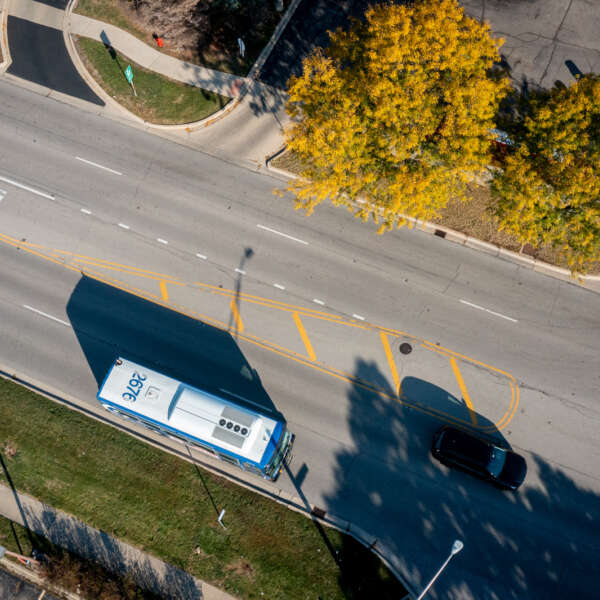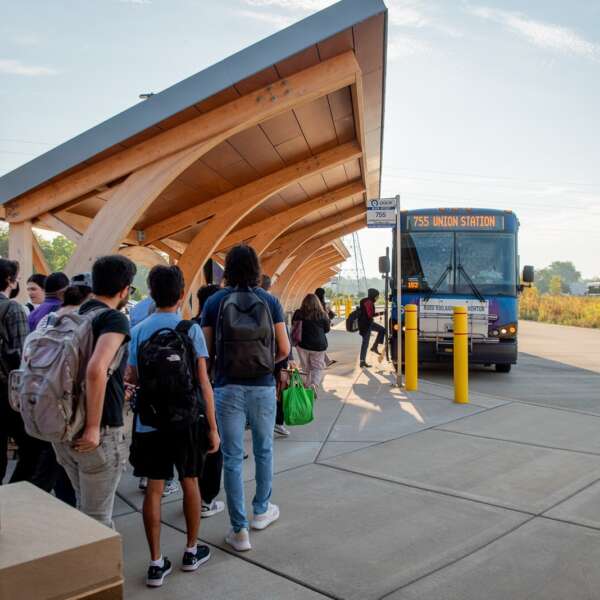Transportation Tuesday recap: Building transit-friendly streets and advancing bus rapid transit
June 13, 2024
June 13, 2024

Partnering with roadway agencies to build more transit-friendly streets and advance bus rapid transit (BRT) is a goal outlined in the RTA’s regional strategic plan, Transit is the Answer, and although CTA and Pace are two of the largest bus operators in North America, the Chicago region is still significantly lacking in transit-dedicated lanes and space on roads. To gain insights and learn from peer regions, the RTA invited experts to share about implementation of successful transit-friendly street designs and BRT projects and programs in Buffalo, San Francisco, and the Twin Cities.
The penultimate Transportation Tuesday, moderated by Peter Kersten, RTA Program Manager for Strategic Plan Implementation, began with a series of presentations from the three panelists followed by a Q&A session.
Nadine Chalmers, Manager of Service Planning at Niagara Frontier Transportation Authority (NFTA), kicked off with the recent history and implementation of the Bailey Avenue BRT project in Buffalo, New York.
After decades of effort to expand the Buffalo region’s light rail line system, Bailey Avenue was identified as a sufficient corridor for a transportation improvement program due to its high ridership rates but low bus reliability and poor pedestrian safety conditions. An improvement study that began in 2021 analyzed the existing transportation infrastructure and focused on long-term approaches for streetscape and transit enhancements. From this study came plans for BRT and other major, local improvements along Bailey Avenue. The project is set to begin community engagement this summer and finish pre-engineering by spring 2026.
Chalmers noted that BRT projects can be challenging and strenuous as they do not only focus on improving roadways, but also include making improvements to transit operations and assets, such as expanding bus facilities, establishing staff capacity, and procuring enough vehicles to be able to run the increased service.
Next was Michael Rhodes, Transit Priority Manager at the San Francisco Municipal Transportation Agency (SFMTA), on the San Francisco Muni Forward transit priority program and the Van Ness Bus Rapid Transit project.
Rhodes shared that street congestion and high traffic volumes have an outsized impact on transit service since the city largely relies on bus or surface rail. To combat this, the Muni Forward transit improvement plan was implemented to prioritize fast and reliable transit service to increase ridership in the region. The project was executed through a quick-build and iterative approach that uses low-cost materials to deliver improvements quickly, such as painting new transit lanes and building temporary boarding platforms or transit stops.
San Francisco’s Van Ness BRT line, a project completed under the Muni Forward improvement plan, is the most used transit corridor in the city, and prior to project implementation, was the highest-injury corridor for pedestrians. The project took 20 years to complete and features center-running bus lanes, high-quality stations, signal priority, and increased pedestrian safety. The Van Ness BRT project improved travel times in the corridor by 30% (8 minutes) and has recovered ridership to 130% of 2019 levels. Rhodes emphasized that increasing bus stop spacing for BRT is essential for improving travel times but requires extensive coordination with the state’s Department of Transportation for streetscape enhancements.
Frank Alarcon, Manager of BRT Projects at Metro Transit in Minneapolis/St. Paul, followed with a presentation on developing Arterial BRT in the Twin Cities. The Arterial BRT framework was designed to prioritize high-use transit corridors throughout the city for faster and more reliable service. The project focuses on building 2-3 new BRT stations and stops per mile, administering pre-boarding payments for faster stops, and updating buses and priority signals, and lanes. A network of eight arterial BRT lines is planned by 2030, and three lines are now complete.
Alarcon reiterated that internal and external partnerships and coordination are vital for successfully implementing improvement projects. Like Chalmers and Rhodes, Alarcon explained that working with other transit and roadway agencies determines at what capacity BRT and transit-friendly projects can be built and operated in a region.
Transportation Tuesday takes place every Tuesday from May 28 – June 18. The webinars are free, but registration is required. Learn more about future events and register to attend here.
Subscribe to our Newsletter
Related Articles
 Coalition members provide feedback on ‘Transforming Transit,’ RTA’s vision for improved service and accountability
Coalition members provide feedback on ‘Transforming Transit,’ RTA’s vision for improved service and accountability
Nearly 200 riders, advocates, and other stakeholders met virtually with the RTA on February 11 for the sixth quarterly Transit is the Answer Coalition meetin...
February 20, 2025 Far South Halsted Corridor Study prepares for future Pace Pulse service
Far South Halsted Corridor Study prepares for future Pace Pulse service
An RTA Community Planning project kicked off in late 2023 as a crucial step in bringing Pace Pulse service to Chicago’s south suburbs. The Far South Halsted ...
February 19, 2025 RTA proposes reforms to prioritize capital projects, maximizing impact of funding
RTA proposes reforms to prioritize capital projects, maximizing impact of funding
RTA is proposing a historic restructuring of the region’s transit governance to maximize the impact of new operating funding and ensure all riders experience...
February 5, 2025 RTA proposes reforms to integrate fares, require accountability for faster and more reliable transit
RTA proposes reforms to integrate fares, require accountability for faster and more reliable transit
RTA is proposing a historic restructuring of the region’s transit governance to maximize the impact of any new operating funding and ensure all riders experi...
February 5, 2025 For the third year in a row, regional transit ridership was up by double-digits in 2024
For the third year in a row, regional transit ridership was up by double-digits in 2024
Ridership across the Chicago region’s transit system continued to increase throughout 2024, according to the latest data from CTA, Metra, and Pace. The regio...
January 28, 2025 RTA is seeking $1.5 billion in annual operating funding. What would that mean for your commute?
RTA is seeking $1.5 billion in annual operating funding. What would that mean for your commute?
On January 15, RTA released Transforming Transit, a vision for the regional transit system with $1.5 billion in annual operating funding supported by a stron...
January 28, 2025